Understanding Copyright Laws in Relation to Food Recipes
Before we dive into the topic of whether food recipes are protected by copyrights, it is essential to have a clear understanding of copyright laws in general. Copyright laws are designed to protect the intellectual property of creators, ensuring that their work is not unlawfully reproduced, distributed or displayed without their consent. In most cases, copyright protection is granted for literary, musical, and artistic works, as well as software and other original creations.
However, when it comes to food recipes, the situation can be somewhat murky. Are recipes considered a form of literary or artistic work? Can they be copyrighted in the same way as other creative works? In this section, we will explore the nuances of copyright laws and how they apply to food recipes.
The Fine Line Between Protecting Recipes and Encouraging Creativity
One of the main challenges when it comes to copyrighting food recipes is striking a balance between protecting the interests of recipe creators and encouraging creativity in the culinary world. After all, recipes have been passed down and adapted for generations, with new twists and variations constantly being developed. If recipes were subject to strict copyright protection, it could potentially hinder culinary innovation and make it difficult for chefs and home cooks to experiment with and share their creations.
As a result, copyright laws tend to focus on protecting the expression of ideas rather than the ideas themselves. This means that while the specific combination of words and images used to describe a recipe may be protected, the actual list of ingredients and basic instructions for preparing a dish are generally not considered copyrightable.
Recipe Books, Websites, and Copyright Infringement
So, where does this leave recipe books, websites, and other collections of food recipes? In most cases, recipe books and websites are protected by copyright laws, but not necessarily for the recipes themselves. Instead, it is the overall compilation, organization, and presentation of the recipes that are typically protected. This means that if someone were to copy the entire contents of a recipe book or website without permission, they could be guilty of copyright infringement.
However, if an individual were to simply recreate a dish from a copyrighted recipe book or website and share their version of the recipe with others, they are unlikely to be in violation of copyright laws, as long as they do not copy the exact wording, images, or other creative elements used in the original source. This is because the basic idea of the recipe (the ingredients and instructions) is not protected by copyright, but rather the specific expression of that idea.
Protecting Your Original Recipes and Creations
If you are a recipe creator, you may be wondering how you can protect your original recipes and culinary creations from unauthorized use or copying. While it is true that the basic ingredients and instructions of a recipe are not typically protected by copyright, there are still steps you can take to ensure that your work is respected and credited appropriately.
One approach is to focus on the unique and creative elements of your recipe, such as the descriptive text, original images, and any additional tips or variations you provide. By making these elements as distinctive and personalized as possible, you will be more likely to have a strong case for copyright protection should someone attempt to copy your work without permission. Additionally, you can register your recipes with a copyright office or other intellectual property organization in your country, which may offer additional legal protections and resources.
Respecting the Rights of Recipe Creators and Sharing Responsibly
As a food lover, blogger, or home cook, it is important to be mindful of the rights of recipe creators and to share recipes responsibly. When using a recipe from a copyrighted source, always give proper credit to the original creator, and avoid copying their exact wording, images, or other creative elements without permission. If you are inspired by a particular recipe and want to share your own version, focus on describing your unique twists and experiences, rather than simply reproducing the original recipe verbatim.
By respecting the rights of recipe creators and understanding the nuances of copyright laws in relation to food recipes, we can continue to enjoy a thriving and innovative culinary community, where the sharing of ideas and flavors is celebrated and protected.









Write a comment